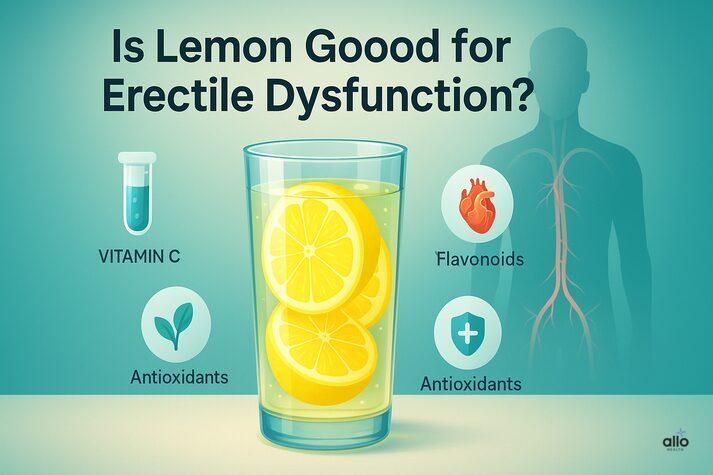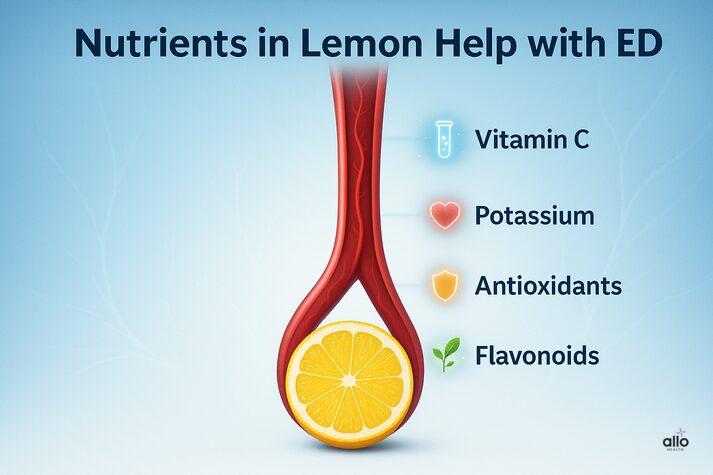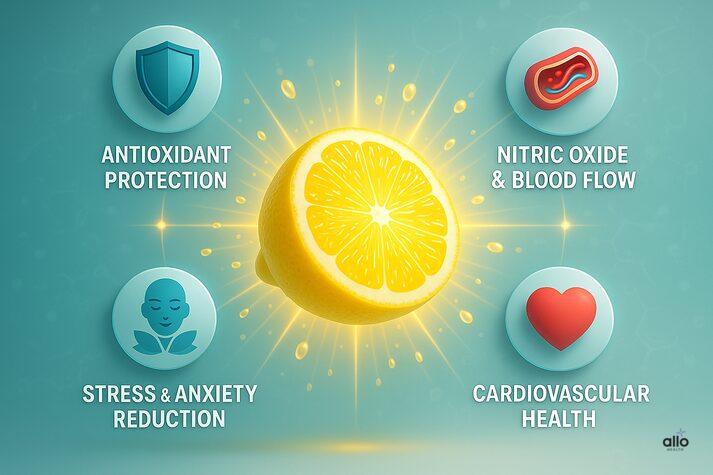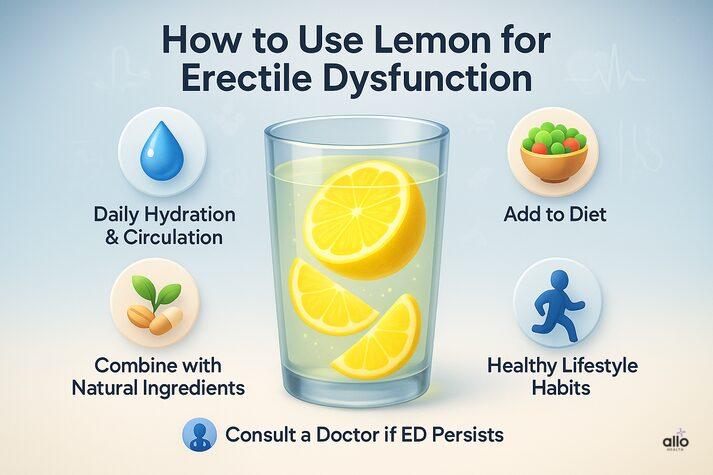Lemon for Erectile Dysfunction: Benefits, Uses, Sexual Impact
Written by Dr. Pranitha Bangera

Dr. Pranitha Bangera is a gold-medalist healthcare professional with an elite foundation in clinical training and patient care. A researcher at heart, she specializes in creating high-impact, research-driven medical content that empowers readers through accessible patient education. Dr. Bangera focuses on the intersection of digital health and clinical communication, specifically within the fields of sexual health and mental well-being. Her work is dedicated to making complex medical innovations understandable and trustworthy for a global audience.
•
September 26, 2025
Our experts continually monitor the health and wellness space, and we update our articles when new information becomes available.

Quick Read
Yes, lemon is good for erectile dysfunction. Lemon’s vitamin C, potassium, and flavonoids may support blood flow, protect blood vessels, reduce oxidative stress, and lower anxiety which are all important for sexual health. It’s not a cure, but part of a healthy lifestyle, lemon can contribute to better erectile function. For persistent ED, professional treatment and medical guidance remain the most effective options.
Many men searching for natural remedies for ED often ask: “Is lemon good for erectile dysfunction?” The short answer is that lemon may help with erectile dysfunction, but only indirectly. Compounds present in lemon may help improve blood flow, protect blood vessels, and reduce stress, all of which play an important role in erectile function. However, lemon is not a cure and works best as part of a healthy lifestyle, rather than as a standalone treatment. Let’s look at what the science says, the nutritional benefits, and how lemon compares with other dietary and lifestyle choices.
What Is The Connection Between Lemon Water and Erectile Dysfunction?
Lemon water is more than just a refreshing drink. It’s packed with vitamin C, potassium, antioxidants, and flavonoids, which are compounds that support healthy blood flow and protect blood vessels. Good circulation is vital for sexual health because when a man is aroused, blood must flow quickly into the penis tissues and stay there long enough to create firmness. If blood vessels are stiff, damaged, or blocked, this process is disrupted, making it difficult to achieve or maintain an erection. By keeping vessels flexible, the nutrients in lemon may indirectly aid erectile function. Animal studies even suggest lemon water can improve sexual behavior and boost antioxidant activity. [1] We will explore these effects of lemon on erectile function in detail next.

Does Lemon Help With Erectile Dysfunction?
Yes, lemon can help with erectile dysfunction thanks to its power-packed nutrients. They aid erectile function in various ways. Let’s see how each of these works.
Antioxidant Properties
Think of antioxidants as “bodyguards” of your cells. Antioxidants like vitamin C and flavonoids in lemon remove free radicals.[2] Free radicals are basically unstable molecules produced during normal body processes. When they build up in excess, they cause damage to your cells. [3] This is known as oxidative stress. Oxidative stress is a big problem for erections because it can:
- Damage blood vessels by making them stiff and narrow.
- Reduce the availability of nitric oxide, a molecule that tells penile tissues to relax so blood can rush in.
Nitric Oxide Production
Lemon supports sexual health mainly by boosting nitric oxide, which relaxes blood vessels for better circulation. Lemon’s nutrients help support this process:
- Vitamin C supports the body’s nitric oxide production by helping enzymes that produce it work efficiently. [4]
- Flavonoids are plant compounds that reduce the activity of an enzyme called PDE-5, which is the same enzyme targeted by Viagra. In men with ED, PDE-5 can act too strongly or too quickly and can limit nitric oxide’s effect. That means nitric oxide doesn’t get enough time to keep blood vessels relaxed, which affects erections. [5]
Cardiovascular Health
Erectile dysfunction doesn’t happen in isolation. In many cases, it’s actually an early warning sign of cardiovascular problems. Because penile arteries are smaller, they tend to show symptoms of reduced blood flow earlier. Lemon, like olive oil and other healthy fats, supports cardiovascular health. It does this because of:
- Potassium: This nutrient plays an important role in keeping blood vessels healthy. High blood pressure can cause ED because it makes vessels stiff and narrow, limiting blood flow to the penis. Potassium helps the body balance excess sodium ( a key cause of high BP) and relaxes the walls of blood vessels. This keeps pressure in check. [6]
- Vitamin C: This powerful antioxidant helps prevent plaque buildup (atherosclerosis), which narrows arteries and restricts blood flow. LDL cholesterol (“bad cholesterol”) becomes especially harmful when oxidized. Oxidized LDL is sticky and clings to blood vessel walls and forms plaque. Vitamin C protects LDL from oxidation and lowers the risk of plaque buildup. [7]
- Flavonoids: These improve overall circulation and keep arteries flexible. Flexible arteries mean better delivery of oxygen and nutrient-rich blood to the heart.
Your heart health and erections are closely connected. Since lemon can support your heart, adding it to your diet is a simple step that may help improve things over time.
Stress and Anxiety Reduction
Erectile dysfunction (ED) isn’t only about circulation or hormones; the mind plays a huge role, too. Many men experience erection problems because of stress or anxiety. When the brain is stuck in “fight-or-flight” mode, the body releases high amounts of a stress hormone called cortisol, which raises heart rate and BP and makes it harder to relax and feel aroused. Lemon can offer support by:
- Helping enzymes break down excess cortisol in the blood. Vitamin C helps with this. This lowers the overall cortisol load and prevents it from staying elevated for too long. [8]
- Protecting the brain from oxidative stress, which can disturb the balance of brain chemicals like serotonin and dopamine. The antioxidants in lemon help regulate these brain chemicals, which are responsible for mood, confidence, and desire, all of which directly impact sexual function.

How to Use Lemon for Erectile Dysfunction
Now that you know the benefits of lemon for sexual health, let us now see how you can add it to your daily routine.
- Drink lemon water daily for hydration and improved circulation.
- Add lemon juice to salads, fish, or a plant-based diet for overall health.
- Combine with other natural ingredients like pumpkin seeds, maca root, or omega-3 fatty acids for broader benefits.
- Scientific studies have shown that lemon balm, which is a herbal extract used in teas, can improve mood, reduce nervousness, and ease anxiety. [10]
Risks Associated With Excessive Lemon Use:
- Tooth Enamel Erosion: The high acidity of lemon can gradually wear down tooth enamel, leading to sensitivity and cavities.
- Stomach Irritation: Too much lemon juice may cause acid reflux, heartburn, or worsen existing gastritis/ulcer symptoms.
- Frequent Urination & Dehydration: Overuse may increase urination and, in rare cases, lead to dehydration.
- Interaction with Medications: Lemon juice can interact with certain blood pressure or iron absorption medications. [11]
Avoid relying solely on lemon for ED treatment. It works best alongside healthy lifestyle habits like exercise, stress-relieving practices, and following a balanced diet.

Other Juices That May Support Erectile Function
If you're interested in knowing what other foods have similar positive effects on sexual health, look no further than this table:
Juice
Benefit for Erectile Function
Orange Juice
Flavonoid-rich, supports vascular health
Pomegranate Juice
Powerful antioxidants
Beet Juice
High in nitrates, directly boosts nitric oxide and blood flow
Watermelon Juice
Contains citrulline, a natural precursor to nitric oxide
Lemon Juice
Rich in vitamin C, flavonoids, and potassium
You may have heard that pineapple juice can improve the taste of semen, but did you know that eating pineapple may also help with erectile dysfunction?
Allo asks
Will you add lemon water to your daily routine to help erectile health?
Bottom Line
So, is lemon good for erectile dysfunction? By now, you might know that lemon is not a miracle cure for erectile dysfunction, but it may offer benefits for erectile function. It does so by supporting nitric oxide production, improving blood flow, reducing oxidative stress, and calming anxiety. When combined with a healthy lifestyle, lemon can be part of a long-term strategy to support sexual health. If you experience persistent ED, talk to a healthcare professional for treatment. Treatments may range from lifestyle guidance to advanced options like penile pumps, vacuum penile pump devices, and ED medications.
Disclaimer
The following blog article discusses food and diet-related information for general educational purposes. However, it is important to note that the information provided is not intended as personalized dietary advice and should not be considered a substitute for professional guidance from a registered dietitian or qualified healthcare professional. Before making any significant changes to your diet or nutrition plan, it is recommended to consult with a registered dietitian or healthcare professional. Dietary changes can have a significant impact on your overall health and well-being. It is important to approach any changes to your diet in a balanced and sustainable manner, ensuring that you meet your nutritional needs and avoid any potential nutrient deficiencies. Rapid or extreme changes in dietary patterns can be detrimental to your health and may require professional guidance. It is crucial to note that any specific dietary recommendations or guidelines mentioned in this article may not be appropriate for individuals with specific medical conditions, allergies, or intolerances. A registered dietitian or healthcare professional can provide individualized advice, including modifications or alternative food choices to accommodate your unique circumstances. The information provided in this article may not encompass all possible dietary considerations or account for the latest research and nutritional guidelines.
Most Asked Questions
. Is lemon good for erectile dysfunction?
Lemon may help erections indirectly. It's nutrients like vitamin C, potassium, and flavonoids support blood flow, protect blood vessels, and reduce stress. But lemon alone isn’t a cure for ED.
Is lemon natural Viagra?
No. While lemon supports circulation and heart health, it doesn’t act as strongly or directly as ED medications such as sildenafil (Viagra) or tadalafil (Cialis). It’s best seen as a supportive food, not a replacement.
How should I use lemon for erectile health?
You can drink lemon water daily, use lemon juice in salads, or combine it with other nutrient-rich foods like pumpkin seeds or omega-3 fatty acids.
Are there side effects of drinking lemon water for ED?
Lemon water is safe for most people, but too much can cause tooth enamel erosion or stomach irritation due to its acidity. Moderation is key.
What juices help with ED?
Lemon juice, pomegranate juice, beet juice, and watermelon juice have also been studied for their benefits in improving blood flow and nitric oxide levels, which help get better erections.
Sources
- 1.
Influence of lemon (Citrus limon) and lime (Citrus aurantifolia) juices on the erectogenic properties of sildenafil in rats with L-NAME-induced erectile dysfunction
- 2.
Comprehensive studies of biological characteristics, phytochemical profiling, and antioxidant activities of two local citrus
- 3.
Oxygen free radicals and the penis
- 4.
Long-term vitamin C treatment increases vascular tetrahydrobiopterin levels and nitric oxide synthase activity
- 5.
Inhibitory effects of flavonoids on phosphodiesterase isozymes
- 6.
Role of potassium in regulating blood flow and blood pressure
- 7.
Beneficial Effects of Citrus Flavonoids on Cardiovascular and Metabolic Health
- 8.
Vitamin C supplementation alleviates hypercortisolemia caused by chronic stress
- 9.
Vitamin C supplementation promotes mental vitality in healthy young adults
- 10.
The effects of lemon balm (Melissa officinalis L.) on depression and anxiety in clinical trials
- 11.
Food–Drug Interactions with Fruit Juices


